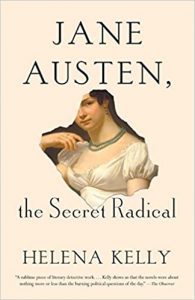Jane Austen and the Zombie Apocalypse

© Mim Saxl Photography, www.mimsaxl.com
At one point in Jane Austen’s Persuasion, the heroine Anne Elliot takes it on herself to recommend some prose reading to an acquaintance who, recently bereaved, is exacerbating his depression with too much poetry. On her list are ‘such works of our best moralists, such collections of the finest letters, such memoirs of characters of worth and suffering, as occurred to her at the moment as calculated to rouse and fortify the mind by the highest precepts, and the strongest examples of moral and religious endurances.’
Anne has enough of a sense of humour to laugh at herself afterwards, and no wonder. This quasi-medicinal view of literature sounds patronising and worthy. Until recently it would have seemed absurdly out-of-date, too. But it’s not a million miles away from the lists of recommended reading which have started appearing in recent weeks.
Supposedly we should be turning to novels about zombie plagues and societal breakdown to inoculate ourselves against our worst, most nightmarish fears and, as a bonus, pick up a few survival tips. Or, because after all, we might be dead by the summer, we should make sure we’ve ticked off some of the big hitters on our bucket lists – the classic works of European literature, the novel we own but have never opened, the book we didn’t finish at school or university.
This is reading as some kind of penance, not for pleasure, but hey, whatever floats your boat at the moment. Another kind of list suggests returning instead to the marshmallow-y comfort of old favourites, the drugging, slumbrous embrace of the books you loved as a child, or have re-read so many times that you can recite whole passages by heart.
Jane Austen is unusual in that she could appear in all three kinds of list – as comfort read, as great work of European literature that you’ve never got round to, and, thanks to Seth Grahame-Smith’s seminal 2009 mash-up, Pride and Prejudice and Zombies, as a tale of plague and doom. She has, so far as I can tell, appeared in only the first two.
But the zombie take on Elizabeth and Darcy’s romance, which manages to keep a remarkable amount of the original story intact, is particularly rewarding at the moment: this best-known of Austen’s novels, familiar (in outline) even to those who haven’t read it, is interrupted, disrupted, remade, opening up corners of the story that you haven’t noticed before, inviting radical reassessment.
The zombies could even be seen as the physical manifestation of the threats which lurk in the original, unseen by many modern readers; invasion and revolution, the fears which haunted Austen’s first readers through years of war.
I don’t want to overstate the intellectual claims of Pride and Prejudice and Zombies because they’re not that extensive, but there’s a lot to be said for approaching a classic novel with an open mind, whether it’s the first time you’ve read it, or the hundredth. You might not always find what you’ve been taught to expect, or what you thought was in there.
This is particularly the case with Austen, who has been pigeon-holed, variously, as a satirist, a writer of social comedy, an exquisite stylist, and, in the last quarter-century, been distilled down into memes and GIFs, brooding men, heaving bosoms and horses galloping in the foreground of big, beautiful houses. If you look at the design on the Austen £10 note you’ll see how firmly these ideas have been entrenched. There’s the big house, the horse and carriage, the frilly, prettified picture of Jane which bears almost no resemblance to the grumpy original sketch. Everything has been softened and simplified. No one can resist that kind of pervasive cultural influence.
Fans of the adaptations may be particularly surprised to find so few horses in the books. Most of the heroines can’t ride, probably connected to Austen’s having lost both a cousin and a close friend to riding accidents. I rather suspect that when her female characters do go on horseback it’s a sign their creator doesn’t like them very much. Austen pays little attention to dresses or, in most of the novels, to physical appearance. She isn’t big on lengthy landscape descriptions.
She is far less straightforwardly romantic than screenwriters would have you believe, nor does she always write for comic effect. Sometimes her comedy is cruel, as when she mocks the ‘large, fat sighings’ of a plump mother mourning the long-ago loss of a child. Many of the concluding marriages feel uncomfortable.
They’re meant to. No one is perfect, in Austen. Nor are their faults petty foibles. Edward Ferrars, in Sense and Sensibility, is aggressively passive. Willoughby is selfish. Edmund, in Mansfield Park, hypocritical. Darcy’s snobbery is not a small failing: by refusing to place himself on formal speaking terms with most of the Bennet family, or their neighbours, he not only creates serious social awkwardness but invites revolutionary ideas about worth and class to take root.
It’s pretty clear in Emma that Mr. Knightley’s intensive farming methods have not benefited the poor, locally. Even Captain Wentworth, the brave naval hero of Austen’s most romantic novel, Persuasion, calmly sets about making sure a poor, sick widow gets her rightful income – from what appears to be a slave plantation.
Even Austen’s writing isn’t always as perfect as you might expect it to be; there are loose threads left hanging, characters doing things out of the blue, the very occasional purple passage.
But Austen’s appeal doesn’t lie just in stylistic perfection, or romantic stories, or comedy. You shouldn’t read her because you think you ought to or because you find her comforting. You shouldn’t read her because of the sudden timeliness of plots in which a chest infection terrifies everybody, in which a daily walk offers the only excitement, and physical contact is strictly controlled. You shouldn’t read even her for hints on a zombie apocalypse.
Read her because she offers nourishing richness and variety; laughter and sadness, romance and politics, love matches and marriages that just about limp on, inadequacy and selfishness alongside goodness and generosity, a through-going cynicism which never excludes the possibility of change and improvement – and of making the best of things, whatever they are.
—
Helena Kelly grew up in North Kent, just down the road from where Charles Dickens used to live. Despite this, she’s always been more of a Jane Austen fan. She’s written academic articles and set Oxford University finals examinations on Jane Austen’s novels and has taught courses on Austen to hundreds of people, of all ages, nationalities, and backgrounds. Twenty years after she first picked up Pride and Prejudice, she is still discovering new things about her favourite author. She lives in Oxford with her husband and son.
Her first book, Jane Austen, the Secret Radical, was published to considerable acclaim by Icon in the UK and Knopf in the US (‘a sublime piece of literary detective work’ – Observer).
https://iconbooks.com/ib-title/jane-austen-the-secret-radical-2/
Follow her on Twitter https://twitter.com/MsAshtonDennis
Jane Austen, the Secret Radical
 A brilliant, illuminating reassessment of the life and work of Jane Austen that makes clear how Austen has been misread for the past two centuries and that shows us how she intended her books to be read, revealing, as well, how subversive and daring–how truly radical–a writer she was.
A brilliant, illuminating reassessment of the life and work of Jane Austen that makes clear how Austen has been misread for the past two centuries and that shows us how she intended her books to be read, revealing, as well, how subversive and daring–how truly radical–a writer she was.
In this fascinating, revelatory work, Helena Kelly–dazzling Jane Austen authority–looks past the grand houses, the pretty young women, past the demure drawing room dramas and witty commentary on the narrow social worlds of her time that became the hallmark of Austen’s work to bring to light the serious, ambitious, deeply subversive nature of this beloved writer.
Kelly illuminates the radical subjects–slavery, poverty, feminism, the Church, evolution, among them–considered treasonous at the time, that Austen deftly explored in the six novels that have come to embody an age.
The author reveals just how in the novels we find the real Jane Austen: a clever, clear-sighted woman “of information,” fully aware of what was going on in the world and sure about what she thought of it. We see a writer who understood that the novel–until then seen as mindless “trash”–could be a great art form and who, perhaps more than any other writer up to that time, imbued it with its particular greatness.
BUY THE BOOK HERE
Category: On Writing
























